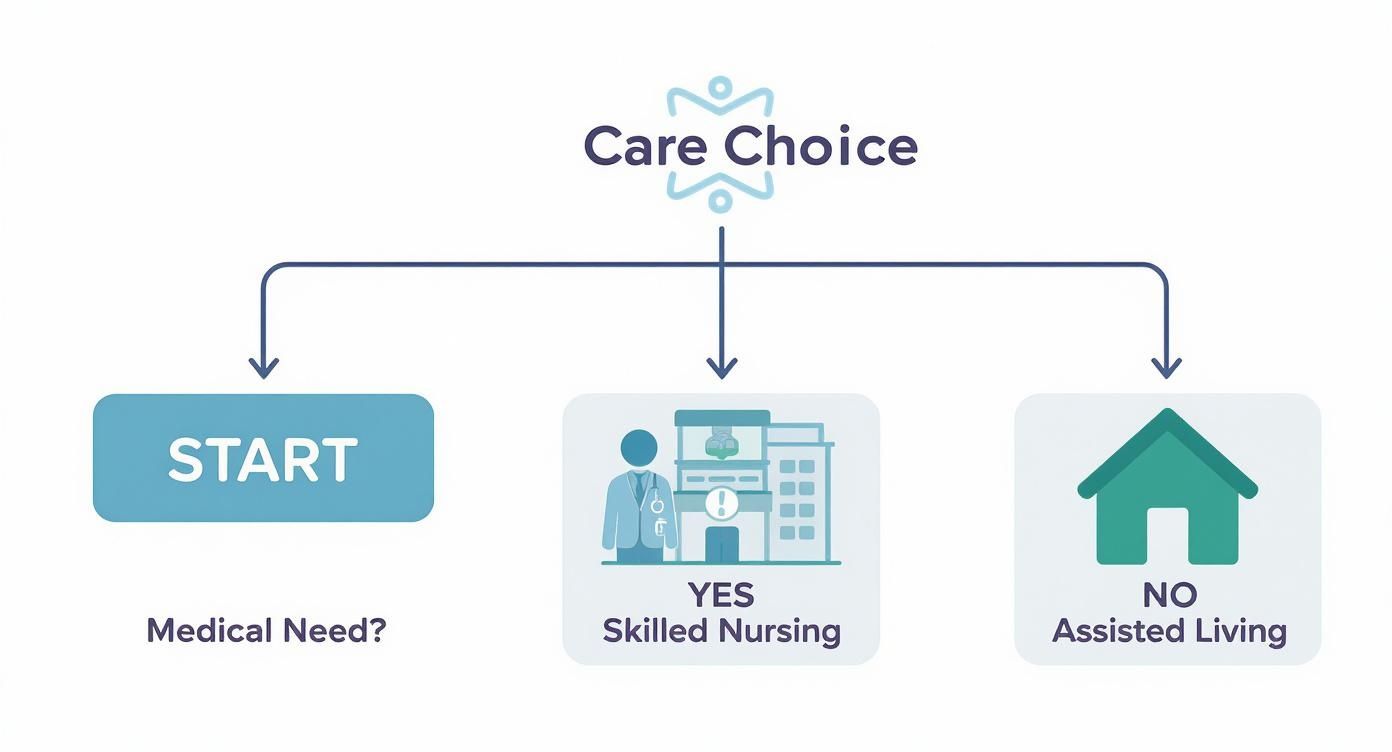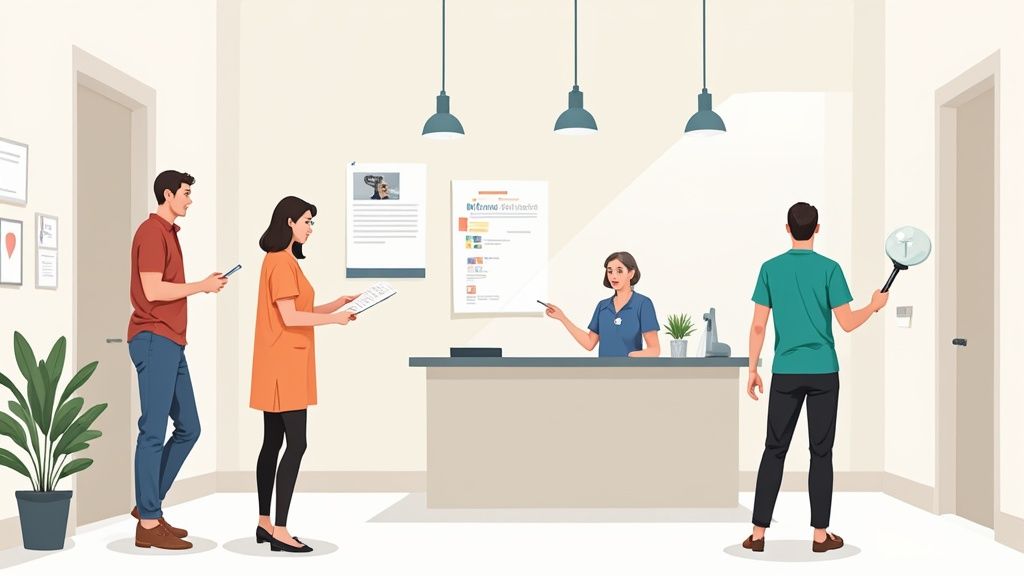What Is Skilled Nursing Care? A Cleveland Family's Guide
When a loved one is in the hospital, the conversation about "what's next" can come up fast, and it’s often stressful. You might hear the term skilled nursing care mentioned, and it's crucial to understand what it actually means for your family in Greater Cleveland.
Think of it as an intensive, short-term stop for medical recovery. It’s a place where licensed professionals—like registered nurses (RNs) and physical therapists—provide round-the-clock care to help someone get back on their feet after a hospital stay. The whole point is to rebuild strength and independence so they can safely return home.

TL;DR: The Quick Facts
-
It’s short-term medical recovery. This isn't a permanent move. It’s a bridge between the hospital and home, designed to provide concentrated therapy and medical oversight.
-
Care comes from licensed professionals. This means RNs, licensed practical nurses (LPNs), and specialized therapists for physical, occupational, or speech needs.
-
A doctor's order is required. A physician must certify that this level of daily, skilled care is medically necessary for recovery.
-
Medicare often foots the bill. For a qualifying stay, Medicare Part A can cover up to 100 days of care.
Who This Helps
This guide is for families in Cuyahoga, Lake, Lorain, Geauga, Medina, and Summit counties who need to quickly understand care options after a loved one’s hospitalization. It’s for anyone feeling overwhelmed and unsure about the difference between a nursing home and short-term rehab.
Key Takeaways for Cleveland-Area Families
Let's boil it down even further for local families navigating this process.
-
Purpose: The primary goal is rehabilitation. Common examples include intensive therapy after a knee replacement, recovery from a severe infection, or regaining function after a stroke.
-
Location: This care takes place in a Skilled Nursing Facility (SNF). These are not just any facilities; they are federally regulated by the Centers for Medicare & Medicaid Services (CMS) to ensure they meet strict standards.
-
Next Step: Your starting point is the hospital's discharge planner or case manager. They are your most valuable resource for identifying and connecting with local SNFs that fit your loved one's needs.
Understanding What Skilled Nursing Care Really Means
Let's cut through the confusing medical terms. The best way to think of a Skilled Nursing Facility (SNF) is as a temporary bridge between the hospital and home. It’s a place built for intensive recovery, designed to help someone regain enough strength and independence to safely get back to their life.

The word "skilled" is the key here. It refers to medical services that, by law, have to be performed by—or under the direct supervision of—a licensed professional like a registered nurse or therapist. This isn't the same as getting help with bathing or meals. This is clinical, hands-on care provided by highly trained experts.
What "Skilled" Services Look Like
To really understand skilled nursing, you have to look at the specific services provided. It’s much more than just a place to rest and recover.
These facilities are equipped to handle complex medical issues that simply can't be managed at home or in a typical assisted living community. The entire focus is on healing and rehabilitation.
Here are some of a SNF’s most common services:
-
Intensive Rehabilitation: Daily physical, occupational, or speech therapy. This is crucial for restoring function after something major like a joint replacement, a stroke, or a big surgery.
-
Complex Wound Care: Managing serious surgical wounds, pressure ulcers, or other injuries that demand sterile dressing changes and professional oversight to prevent infection.
-
IV Therapy: Administering medications, fluids, or nutrition directly through a vein, which can only be done by a licensed nurse.
-
Post-Surgical Care: Closely monitoring vital signs, managing pain, and making sure the recovery process is on track after a significant operation.
The Heart of Quality Care: Communication
A huge part of what makes skilled nursing care effective is the seamless communication between medical staff. Thorough handoffs are critical for providing continuous, high-quality care. This is often managed through incredibly detailed reports. In fact, many professionals use structured nursing handoff report templates to make sure every detail gets passed from one shift to the next.
This level of detailed coordination is essential. The care team is constantly tracking progress, adjusting treatment plans, and preparing the patient for a safe discharge home. It’s a dynamic, medically-driven environment from top to bottom.
Example: A Cuyahoga County Family's Journey
- Situation: Your mother, who lives in Parma, falls and breaks her hip. After surgery at a Cleveland Clinic hospital, she’s not strong enough to go home yet.
- The Recommendation: The hospital discharge planner suggests a short-term stay at a local SNF. Her doctor agrees, noting she needs daily physical therapy and skilled nursing care to manage her surgical incision.
- The Goal: This stay isn't permanent. The plan is for her to receive 3–4 weeks of intensive therapy to rebuild her strength and learn how to move safely again. After that, she can return home, maybe with some temporary home health support to ease the transition.
Ultimately, skilled nursing provides that crucial level of care for those moments when medical needs are too high for any setting other than a hospital. It fills that critical gap, delivering the focused, professional care someone needs to get back on their feet and back to their life.
Skilled Nursing vs. Assisted Living: Making the Right Choice
It's one of the most common points of confusion for families: what’s the real difference between skilled nursing and assisted living? They might sound similar, but they serve completely different purposes, operate under different rules, and are paid for in very different ways.
Getting this distinction right is the most important step you can take. Choosing the wrong type of care can lead to unnecessary stress, wasted money, and a support system that doesn't match what your loved one actually needs.
The Four Key Differences
To understand the difference, look at four core areas: their main purpose, the level of care they provide, who’s on staff, and how you typically pay.
-
Primary Purpose: Think of skilled nursing as being for medical recovery, almost always after a hospital stay. In contrast, an Assisted Living (Residential Care Facility), as it's licensed in Ohio, is all about daily living support for seniors who are mostly independent but need a hand with things like meals or managing medications.
-
Level of Care: Skilled nursing delivers clinical care from licensed medical professionals. Assisted living provides personal care and help with activities of daily living (ADLs), like bathing and dressing.
-
Staffing: A Skilled Nursing Facility (SNF) has licensed nurses (RNs and LPNs) and therapists on-site 24/7. An assisted living community is staffed primarily with caregivers and aides.
-
Payment: Medicare is the main payer for short-term skilled nursing stays. Assisted living is almost always paid for with private funds or long-term care insurance. In Ohio, some residents may qualify for the Medicaid Assisted Living Waiver (AL Waiver) to help with costs.
This difference in purpose and regulation is huge. SNFs are a massive part of our healthcare system, especially as more people need post-hospital care. According to Market.us, the global long-term care market was valued at about $1.1 trillion in 2022. It’s a critical piece of the recovery puzzle for thousands of seniors every day.
Skilled Nursing vs. Assisted Living at a Glance
To make it even clearer, let's put these two options side-by-side. Remember that in Ohio, assisted living communities are licensed as Residential Care Facilities (RCFs), while SNFs are regulated at the federal level by the Centers for Medicare & Medicaid Services (CMS). This table breaks down the essentials for Ohio families.
<br>| Feature | Skilled Nursing Facility (SNF) | Assisted Living (RCF) |
| :----------------------- | :------------------------------------------------------------------- | :-------------------------------------------------------------- |
| Main Goal | Short-term medical rehabilitation to help someone return home. | Long-term support with daily activities in a residential setting. |
| Care Provided | Clinical services like IV therapy, wound care, physical therapy. | Personal care, meals, housekeeping, social activities. |
| Typical Resident | Someone recovering from surgery, a stroke, or a severe illness. | A senior who needs help with bathing, dressing, or medications. |
| Staffing Model | 24/7 licensed nurses (RNs/LPNs), therapists, and a medical director. | Caregivers, aides, and an activities director. A nurse may be on-call. |
| Primary Payer | Medicare Part A for up to 100 days (following a qualifying stay). | Private pay, long-term care insurance, or the Ohio AL Waiver. |
| Ohio Regulation | Federally regulated by CMS; state oversight by the ODH. | Licensed by the Ohio Department of Health (ODH) as an RCF. |
<br>Seeing it laid out like this highlights the fundamental divide. They are two distinct tools designed for two very different jobs.
What This Means for You
If your loved one is coming out of the hospital and needs daily medical treatment from a nurse or intensive therapy to walk again, you need a Skilled Nursing Facility. If they are generally healthy but can no longer manage their home safely and just need help with daily tasks, assisted living is likely the right choice. Our local advisors can help you explore options if you're looking into assisted living in Cleveland.
A Checklist to Guide Your Decision
Still not sure? Run through these quick questions. Your answers will point you in the right direction.
Checklist: Which Level of Care is Needed?
-
Does my loved one need daily medical treatments (like IVs or wound care) that must be done by a licensed nurse? (Yes = likely Skilled Nursing)
-
Did a doctor order intensive, daily rehabilitation (physical, occupational, or speech therapy)? (Yes = likely Skilled Nursing)
-
Is this care needed immediately following a qualifying 3-day hospital stay? (Yes = likely Skilled Nursing)
-
Is the main issue help with bathing, dressing, meals, and medication reminders? (Yes = likely Assisted Living)
-
Is your loved one looking for a long-term, permanent place to live with social activities? (Yes = likely Assisted Living)
-
Can they get around on their own, even if it’s with a walker or cane? (Yes = likely Assisted Living)
When Is Skilled Nursing Care Necessary?
Figuring out if a loved one truly needs this level of care can be the toughest part of the process. Let's be clear: skilled nursing isn't for everyone. It’s designed specifically for those moments when a person's medical needs become too complex to be managed at home or in an assisted living community. The need is almost always sparked by a significant medical event.
Common situations include recovering from a major surgery, like a knee replacement at a Cleveland Clinic or University Hospitals facility, where daily, intensive physical therapy is non-negotiable. Another trigger is a serious health crisis, like a stroke, which demands a coordinated team of nurses and therapists to help rebuild speech and mobility. It’s also the right choice for managing complex conditions that require daily medical tasks, such as intricate wound care or administering IV medications.
Common Triggers for Skilled Nursing
Think of these situations as clear signals that a higher level of medical care is essential for a safe recovery. If your family member is facing one of these challenges, their doctor or hospital team will almost certainly recommend a skilled nursing facility as the next step.
-
Intensive Rehabilitation: After a joint replacement, major heart surgery, or a severe fracture.
-
Stroke Recovery: When someone needs a combination of physical, occupational, and speech therapy to regain their independence.
-
Complex Wound Management: For surgical wounds, diabetic ulcers, or pressure sores that require sterile dressing changes and monitoring by a licensed nurse.
-
IV Therapy: For giving antibiotics, hydration, or other medications that can't be taken by mouth.
-
Recovery from a Severe Illness: After a tough battle with pneumonia, a serious infection, or a significant health decline that requires round-the-clock medical oversight.
This simple decision tree really boils it down: if the main issue is medical, the path leads to skilled nursing. If it’s about help with daily living, assisted living is likely the better fit.

The visual drives home the key point—skilled nursing is a medical necessity, not a lifestyle preference. The decision is almost always guided by a doctor’s orders based on a clear, clinical need for recovery and stabilization.
The Role of the Hospital Discharge Planner
The good news is you are not expected to figure this out on your own. When a loved one is hospitalized anywhere in Northeast Ohio, a hospital discharge planner or case manager becomes your most valuable guide. Their entire job is to assess a patient's condition before they leave the hospital and map out the safest next step for their recovery.
If the planner determines your family member isn’t strong or stable enough to return home just yet, they will recommend a short-term stay at a Skilled Nursing Facility (SNF). They will give you a list of local facilities that have open beds and are equipped to handle your loved one’s specific medical needs.
Navigating the Costs of Skilled Nursing Care in Ohio
For most families in the Cleveland area, the biggest question is always the same: "How on earth are we going to pay for this?" Getting a handle on the financial side of skilled nursing is absolutely critical, and the rules, especially when it comes to Medicare, can feel incredibly complicated. Let’s walk through how payment works, focusing on the options right here in Ohio.
The first thing to understand is that skilled nursing care is usually for short-term, medically necessary recovery. Because of this, the primary payer isn't your personal savings—it's often Medicare. This is a huge difference from something like assisted living, which is almost always paid for out-of-pocket.
How Medicare Part A Covers Your Stay
When someone needs a short-term, rehabilitative stay, Medicare Part A is the main source of coverage. But it's not a blank check. Medicare has very strict rules about when it will pay, and its coverage is designed for a specific recovery period after a qualifying hospital visit.
To be eligible for Medicare coverage in a Skilled Nursing Facility (SNF), a person must meet several criteria set by the Centers for Medicare & Medicaid Services (CMS).
Medicare Eligibility Checklist for SNF Care:
-
You must have Medicare Part A and have days available in your benefit period to use.
-
You need a qualifying hospital stay. This is a big one: you must have been admitted as an inpatient for at least three consecutive days. Time spent in the hospital under "observation" status does not count.
-
Your doctor has to certify that you require daily skilled care that can only be provided in a SNF.
-
You must be admitted to the SNF within 30 days of leaving the hospital for the same condition.
Once you’ve met those requirements, Medicare’s coverage kicks in on a set schedule for up to 100 days.
-
Days 1–20: Medicare pays 100% of the cost. You pay nothing.
-
Days 21–100: You become responsible for a daily copayment. For 2024, that amount is $204 per day. Many Medicare Supplement (Medigap) plans are designed to cover this exact cost.
-
Beyond Day 100: Medicare coverage ends, and you are responsible for all costs.
This entire structure is built to support a temporary recovery, not a permanent living situation.
What Happens After Medicare Coverage Ends?
If your loved one needs care beyond that 100-day Medicare limit, or if their care is considered long-term or "custodial" (meaning they need help with daily activities, not intensive medical care), you’ll need to turn to other ways to pay.
For long-term stays in a nursing facility, the most common options in Ohio are:
-
Ohio Medicaid: This is a joint federal and state program for people with limited income and assets. If a person qualifies, Medicaid can cover the full cost of long-term care in a nursing facility. Be prepared for a detailed application process that requires extensive financial paperwork.
-
Long-Term Care Insurance: If your loved one has a policy, now is the time to use it. Contact the insurance company to review the policy’s benefits, coverage limits, and any "elimination period"—a waiting period before payments start.
-
Private Funds: This means paying out-of-pocket using personal savings, investments, or other assets. For a closer look at what care costs in our area, you can explore our complete guide to senior living costs in Cleveland.
What This Means for Your Budget: Estimating Medicare Costs
You can get a rough idea of your out-of-pocket costs with some simple math. Let’s say the team projects your loved one will need a 30-day stay.
- First 20 Days: $0 (Covered by Medicare)
- Next 10 Days: 10 days x $204/day (2024 copay) = $2,040
- Total Estimated Cost: $2,040 (if you don't have a supplement plan)
It’s always a good idea to confirm the current copayment amounts on the official Medicare.gov website, as they change each year. This quick calculation helps you prepare for the financial reality of a short-term rehab stay.
Trying to figure out these payment systems can feel overwhelming, but you don't have to do it alone. The facility's admissions director and the hospital's discharge planner are your best resources for understanding your specific financial responsibility and exploring every option available.
How to Choose a Skilled Nursing Facility in Cleveland
It's a moment many families dread. You're at the hospital, and the doctor says your loved one isn't ready to go home yet—they need skilled nursing care. Suddenly, you're handed a list and told to pick a facility, often with less than 48 hours to decide. The pressure can feel overwhelming.
This is a high-stakes decision, but you don't have to make it in the dark. With a clear plan, you can cut through the noise and find a place that provides the excellent medical care and rehabilitation your family member deserves.
The hospital's discharge planner is your starting point. They'll give you a list of local Skilled Nursing Facilities (SNFs) in Cuyahoga, Lorain, Medina, or nearby counties that have open beds and can handle your loved one’s specific medical needs. That list is where your real work begins.
Step 1: Start with Official Data
Before you make any calls, your first stop should be Medicare's official Care Compare website. This is a non-negotiable step. The site is a federal resource that gives you unbiased data on every single Medicare-certified facility in the country, from star ratings to inspection reports and staffing levels. It’s the best way to create a solid shortlist.
You can start your research by simply typing in your city or zip code.

The Care Compare tool lets you see how local Cleveland-area facilities stack up against each other based on hard data—not marketing fluff. You can compare health inspection results, how many hours of care each resident gets, and other critical quality measures.
Step 2: Read the Inspection Reports
This is where you get the real story. In Ohio, every SNF is inspected regularly by the Ohio Department of Health, and these full reports are available right on the Care Compare site. They detail every single deficiency found, whether it's a minor paperwork issue or a serious problem with patient care.
Pay close attention to both the number and the severity of citations. This is your most direct look into what life is actually like inside that facility day-to-day. Staffing is, of course, central to quality care. While global nursing workforce trends are complex, you can learn more about global nursing workforce trends from the WHO.
Step 3: What to Look for During a Tour
If you have time for a quick tour—and you should try to make time—it's invaluable. When you walk in, go past the fancy lobby and trust your gut. Use your senses.
Does the building smell clean? Or does it smell of urine? Are residents up and about, or are they slumped in wheelchairs in the hallway? Listen to how staff members talk to residents. Is their tone respectful and kind, or short and dismissive? Those small interactions tell you everything you need to know about the culture of care.
For a more comprehensive look at evaluating different senior care options, our guide on choosing the right senior living community is a great resource.
What This Means for You: Focus on What Matters Most
A beautiful building with a grand piano in the lobby doesn't guarantee good care. The things that truly matter are the people and the clinical systems. Prioritize facilities with consistent, stable staffing, a strong in-house therapy team, and a clean track record on their state inspections. These are the factors that will have the biggest impact on your loved one's recovery.
Step 4: Ask the Right Questions
When you visit or call, have a list of questions ready. Here’s a checklist to get you started.
Checklist for Evaluating a Cleveland-Area SNF
-
[ ] Staffing: What are your staff-to-resident ratios for nurses and aides, especially on weekends and at night? What is your staff turnover rate?
-
[ ] Therapy Services: Is your therapy team employed by the facility or from an outside agency? How many days a week will my loved one receive therapy, and for how long each day?
-
[ ] Medical Oversight: Who is the medical director? How often does a doctor or nurse practitioner physically see the residents?
-
[ ] Communication: How will you keep our family updated on my loved one’s condition and progress? Who is our main point of contact?
-
[ ] Discharge Planning: What does your discharge planning process look like? Do you help arrange for things like home health care and medical equipment for a safe return home?
What to Do Next
Feeling overwhelmed is normal, but taking small, concrete steps can make the process manageable. Here's what you can do right now.
-
Talk to the Hospital Discharge Planner. This is your first and most important conversation. Ask them for a list of recommended SNFs and for their honest assessment of your loved one's needs.
-
Use Medicare's Care Compare Website. Take the list from the hospital and immediately look up each facility online. Compare their star ratings, staffing levels, and recent inspection reports. This will help you narrow down your choices quickly.
-
Make Two or Three Phone Calls. Call the admissions director at your top two or three choices. Ask them the questions from the checklist above. If you have time, schedule a brief tour.
#
<!-- FAQ rendered separately -->Need Help Finding Senior Living in Greater Cleveland?
Our Greater Cleveland local advisors can provide personalized recommendations, schedule tours, and answer all your questions—completely free.